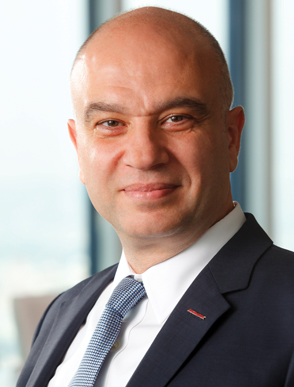Akbank took the decision to embrace open banking ahead of wider adoption in the Turkish market in order to gain a competitive advantage. Chief operating officer Turgut Güney outlines the bank’s innovation strategy to Joy Macknight.
Akbank began closely monitoring the ‘open banking’ trend back in 2013. As smartphone adoption grew and new mobile apps flourished, the Turkish bank tracked the way customer needs and expectations were evolving. In order to survive and thrive in a highly competitive domestic market, the bank decided to respond to these changes by embracing disruption, innovation and agility.
So Akbank opened up its application programming interfaces (APIs) to third-party developers, start-ups and financial technology (fintech) companies from across the world through its API developer portal, which went live in April this year. “This strategy enables Akbank to reach beyond traditional partners, creating a new channel through this diverse business ecosystem,” says Turgut Güney, Akbank’s executive vice-president in charge of IT and operations.
The bank wanted to be ready before the Turkish government and regulatory bodies developed API standards, and used its position as an early adopter to gain a competitive advantage. However, while being at the forefront of innovation has many advantages, it also brings challenges because the regulations are not in place to guide development, according to Mr Güney. In addition, he faced internal concerns regarding security, as well as uncertainty from the business units as to how open banking differed from historic third-party service integrations.
Keys to success
Putting security first helped the team overcome internal resistance and ensure a successful rollout of the strategy, according to Mr Güney. “We defined the security policies and strategies, and then chose CA Technologies’ Layer 7 product, which has strong features and is considered to be best of breed, especially for security,” he says.
The second key to success was to start with a limited project scope. Mr Güney says: “We initially launched the developer portal with read-only data APIs for non-sensitive information such as branch locations, currency rates, and so on. As we gain experience on this small and simple platform, we plan to launch more complex APIs.”
Mr Güney has been pleasantly surprised with how quickly the developer community has accepted the bank’s API developer portal: more than 300 have registered to date. For example, one developer has used the bank’s ‘Find ATM’ service in their chatbot application. The bank’s technical team supports the developers, as well as acting as bridge to evaluate new ideas with the digital banking and project management office.
Getting there first
More recently, the bank launched a project called Faturamatik, opening up its bill payment infrastructure to third parties so that the latter can use APIs for bill payment services. Additionally, it is collaborating with two companies on utility bill collections via hundreds of payment points across Turkey. The companies are delivering customer services, while the bank is providing back-end processing services.
There is no doubt in Mr Güney’s mind that the open banking initiative has consolidated Akbank’s innovative approach and strengthened its market leadership. “First, this initiative has the potential to position Akbank as the first partner for the fintech ecosystem in Turkey. Second, consumers will have transparent access to financial services through third-party applications, which will improve their customer experience and ease of use. We believe this will directly increase the brand perception of Akbank.
“Third, the initiative has already started attracting attention from different communities, locally and globally, and we have received positive feedback from developers,” he adds. Having a high profile as an innovator in the market will also help the bank to attract young and creative talent.
Akbank’s future will be built on a digitalisation plan to ensure its pioneering role in Turkey’s financial services industry, according to Mr Güney. “Digital transformation presents both opportunities and threats. We are investing heavily on transforming our sales and service models based on digitalisation. We are taking necessary steps forward, while keeping an eye on future developments and market conditions,” he says.
Branch changes
While digitalisation will automate and improve banking processes, Mr Güney believes that it will also change the role of branches. In the digital era, branches will be smaller with different formats – some will be machine-only, while others will have a few tellers. However, he argues, a physical presence remains a necessity to instil consumer trust.
“Banks need to have few high street, showcase and highly tech-enabled hub branches. However, they might also offer video banking services that let customers talk to a banking expert face-to-face from the comfort of their own homes,” he explains.
The Internet of Things (IoT) will be another differentiating factor in the future. “Banks will utilise big data, cloud and IoT technologies to gain insight, as well as boost efficiency and productivity in customer service,” says Mr Güney.
Continuing to invest in its open banking initiative, Akbank plans to add new banking APIs to its developer portal, build relationships with universities and other third parties, and organise hackathons over the next 12 months. It will also investigate opportunities to extend its API services bundled with other third-party global cloud-based platforms.



